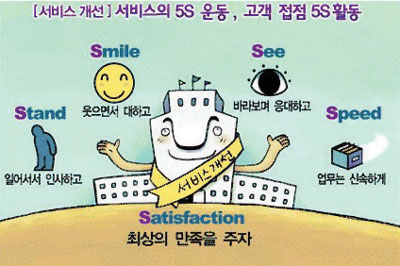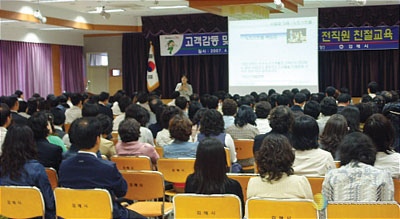
We have all met 'kind' service workers. Their kindness makes our transactions more enjoyable. The e-today newspaper explains that the service sector now makes up over 50 percent of all industry in Korea, and will continue to grow rapidly in the future.
In this environment of rapid growth, 'customer satisfaction' becomes a key concept for service enterprises. The emphasis on the satisfaction of the customer has led to the rise in importance of so-called "emotional labor." The market value of a service enterprise is now determined by the ability of its staff to convey positive emotions to clients.
The phrase, "emotional labor" was coined in 1983 by Arlie Russell Hochschild, a professor of sociology at the University of California, Berkeley. It relates to the ability of a worker to control his or her natural swings of emotion while at the same time exhibiting positive expressions and gestures.
The number of service workers engaged in "emotional labor" is increasing. What then is their position in our society? YNO met a laborer who works in a family restaurant. Let's listen to what he said on this matter.

YNO: The display of kindness is a very important aspect of service in a family restaurant. Is it difficult to smile all the time? What is the most difficult part of your job?
Shin: I meet various people in various situations and it is very difficult to always control my emotions and to keep smiling. I'm under constant stress because my manager requires me to show unconditional kindness to my customers.
YNO: Have you changed in any way since you started to work in the service sector?
Shin: Actually, outside work, it is usually easy for me to get on with people. In the work situation, however, it is sometimes difficult to suppress my real emotions. Furthermore, when I see my co-workers practicing emotional duplicity I begin to distrust them as people.

Customer satisfaction is the emotional laborers first priority. What effect are these artificial displays of emotion having on the workers?
Their difficulties can be classified as mental, physical, and social. These "emotional-labor" practices, which require holding one's own emotions in check, can lead to mental stress. In extreme cases, melancholia and anthrophobia can develop.
The workers' self-respect can be eroded and they can become tormented by doubts about their own identities; thinking such thoughts as, 'I think I am not me' or, 'I think I live in an empty void.'
Simple stress-related diseases can grow into serious mental disorders such as panic and alienation which can cause hallucinations and delusions. In extreme cases, emotional frigidity may result in the loss of the ability to feel or express any emotion.
Workers in the "emotional-labor" sector live a double emotional standard, which can cause not only mental disorders but also, as natural immunity is reduced, physical disease. They can suffer stress-related diseases such as indigestion, insomnia, and irritable bowel syndrome.
Workers can also experience a serious physical disease called "metabolism syndrome." - a coma-like state in which certain organs may adopt a 'sleeping-mode' for up to two years.

This potential for mental and physical damage is not limited to the emotional-laborers themselves. It can also affect those with whom the workers have relationships. In the more advanced stages of this mental and physical damage the victims do not want to express their own emotions or even talk with others. Therefore, they lose the ability to enjoy fulfilling social relationships and are often unable to control their tempers. They are aggressive to the weak and often lose their tempers with their subordinates at work or with their own elderly parents. If the victim is a married woman, she can have a negative effect on the family as she vents her anger on her husband and children.
The distress that a laborer in the service industry undergoes can have an adverse effect on the enterprise for which he or she works. The more extreme the demands on the emotional-laborer, the faster the laborer will become mentally exhausted. The resulting reductions in the laborer's loyalty and desire to serve will likely cause a slump in the enterprise's output. The high resignation-rate among experienced staff is a serious problem in the service sector.

We have seen that the emotional laborer is prone to mental, physical, and social distress. Let's look more closely at the 'mental' category. Customers often judge individual workers in terms of their level of academic achievement. Furthermore, female workers are judged in terms of the social standing of their husbands and are treated accordingly, sometimes causing them severe mental pain.
Service-industry labor is similar to household labor in which the housewife renounces her own individuality. However, customers, unlike most husbands, make the workers' situation worse by treating them impersonally.
The 'social' dimension to the problem is often not recognized by employers. In the case of visible physical damage we assume that the corporation would make amends to the laborer through monetary compensation. However, the hypochondria, anthrophobia, and schizophrenia caused by the work-practices within the corporation are often seen as the fault of the individual worker. The laborers themselves can not always recognize the existence of these problems nor the fact that they are a result of the emotional strain of the workplace. Therefore, countermeasures are not taken against "emotional labor"-induced individual and social problems.

Also, most workers who engage in "emotional labor" are destined to stay in the same job for the rest of their lives. Mental, physical, and social problems, which may result from a lifetime of suppressing their real emotions, are often blamed on the workers themselves. Workers who suffer from a wide variety of work-induced illnesses often have to carry the additional burden of being branded as 'troublemakers.'
We need solutions to the problems experienced by our "emotional labor" force. Specialists recommend prevention rather than cure. One psychiatrist recommends strategies such as 'separation of work and me,' the control of indignation, and the rejection of negative thoughts.

Prevention is seen as the best solution because a mentally healthy individual is less likely to develop mental problems. Also, because engaging in "emotional labor" is often a person's sole means of livelihood, prevention is a better solution than resignation.
Solutions on the 'social' side should include systematic and complementary measures such as the improvement of the welfare system and the development of work-stress reduction programs.
The EAP-system, aims to reduce the levels of workers' stress through consultation with specialist. Sources of stress picked up not only in their place of work but also at home, in managing their finances, and in their careers, are all taken into account. After workers have been through the EAP-system, rates of absenteeism are reduced by as much as 78 percent and mental health indicators rise by an average of 38 percent.
In the U.S. a company-based system compensates the families of some "emotional labor" suicide victims.
Enterprises should attempt to monitor the laborer's work-load and pay careful attention to levels of job-satisfaction. If the work-load is too heavy, due to under-staffing, the quality of service will likely be reduced and complications in dealing with customers will arise.

When "emotional labor" leads to an internal struggle between the need to survive and the need to exhibit artificial kindness, we should begin to recognize that the problem also has a 'social' dimension.
Society should attach importance not only to 'customer satisfaction' but also to 'laborer satisfaction'. These principals should be incorporated into company-thinking and should be respected by the whole society. Perhaps then, we will begin to limit the damage done in the name of "emotional labor."

| Dong-Woo Seo _ seoproducer@ynu.ac.kr |
| Sung-Mok Jeon _ bloodytaker@ynu.ac.kr |


